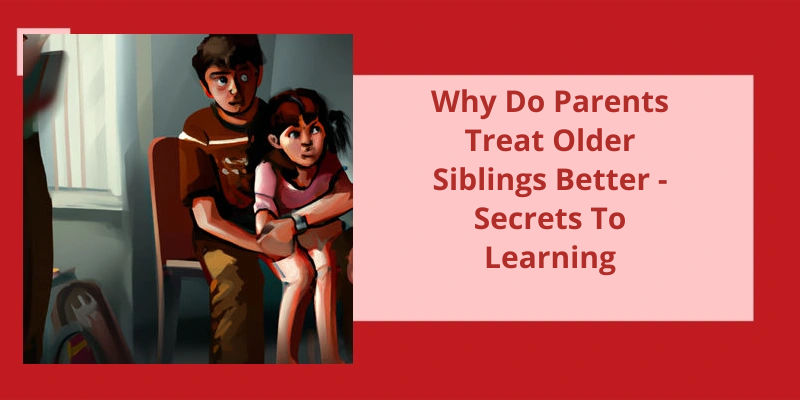When it comes to the dynamics of family relationships, the treatment of older siblings often poses an intriguing question. While it’s important to note that not all parents favor their older children, this phenomenon can be attributed to several key factors. First and foremost, parents may have higher expectations for their firstborn, as they’re seen as pioneers in navigating the challenges of parenthood. Additionally, older siblings often serve as role models for their younger counterparts, leading parents to place greater emphasis on their achievements and academic success. Moreover, parents may have more time and resources available to invest in their first child's development, as they’re still adjusting to the responsibilities and demands of parenthood. Understanding these underlying motivations can provide valuable insights into fostering a supportive and equitable learning environment for all siblings within a family.
Why Do Younger Siblings Get Better Treatment?
Parents often treat older siblings differently due to a variety of factors, including a desire to set a positive example for younger siblings. As the firstborn child, the older sibling serves as a role model for their younger counterparts. Parents hope that by being stricter with the older child, they can instill discipline and responsible behavior that will trickle down to the younger siblings. The notion is that if the older child is allowed to get away with reckless behavior, the younger ones will likely mimic such actions. Consequently, parents tend to be more watchful and demanding of their older children, holding them to higher standards.
Ultimately, parents strive to create a nurturing and supportive environment for all their children, taking into account individual needs and circumstances. Understanding the dynamics that influence parental behavior towards their children helps foster empathy and promotes healthy sibling relationships.
The Long-Term Effects of Differential Treatment on Sibling Relationships
- Increased resentment between siblings.
- Damage to trust and loyalty.
- Higher likelihood of conflicts and arguments.
- Potential deterioration of communication.
- Decreased emotional support between siblings.
- Negative impact on overall family dynamics.
- Possible long-term estrangement or distancing.
- Emotional and psychological consequences for involved siblings.
- Potential reinforcement of negative behavior patterns.
- Difficulty in establishing healthy adult relationships.
A study exploring the differential treatment of children by parents has shed light on a fascinating trend: parents often favor their younger offspring. Susan M. McHale and Alexander C. Jensen, the researchers behind this investigation, discovered that younger siblings tend to believe that they’re the favored child, leading their parents to favor them as well. This intriguing finding challenges conventional notions about parental bias and opens up new avenues for understanding family dynamics.
Why Do Parents Favour the Younger Sibling?
Parents often have a special bond with their younger children, and this can lead to them treating the older sibling differently.
Another contributing factor could be the age and developmental stage of the parents themselves. Older parents may feel more relaxed and confident in their parenting abilities by the time the younger child arrives, whereas they might have been more strict or unsure when the older sibling was growing up. This newfound confidence can translate into a more laid-back approach with the younger sibling, which may give the perception of favoritism.
Moreover, parents might be influenced by societal expectations or stereotypes that place a greater emphasis on the achievements and successes of the elder child. This can inadvertently create a sense of uneven treatment and favoritism.
It’s important to communicate your feelings to your parents in a calm and respectful manner. By sharing your perspective and expressing how their actions make you feel, they may become more aware of the impact it’s on you. Remember, your parents love you all equally, and addressing this issue can help strengthen your bond with them and create more inclusive family dynamics.
Why Do My Parents Prefer My Older Sister?
Why do parents treat older siblings better? This is a question that many younger siblings have pondered. It can be disheartening to feel like your parents have a preference for your older sister. However, it’s important to understand that parents actions aren’t always a reflection of their true feelings.
Sometimes parents see the oldest as more independent and needing less than the younger children. As the firstborn, your sister may have already gone through many milestones and challenges that parents feel more confident in handling. This doesn’t mean that they love her more, but rather they may have more experience in navigating her needs.
It could be possible that your parents have no idea that their actions have made you feel less special. Oftentimes, parents are unaware of the impact their behavior has on their children. They may be focused on their own responsibilities and inadvertently not giving you the attention you desire. It’s important to communicate your feelings to them so that they can understand the effect of their actions and make an effort to change.
It’s wonderful that you haven’t allowed your feelings to turn into resentment of your sister. It’s easy to let jealousy and bitterness take hold, but it’s important to remember that your sister isn’t to blame for your parents actions. Instead, focus on fostering a healthy relationship with her and finding support and validation in other areas of your life.
It’s also worth noting that every family is different, and parents treatment of their children can vary. It’s important not to compare yourself to your sister or other families. Instead, focus on your own growth and development. Seek out opportunities for personal growth and learning, whether it be through school, hobbies, or extracurricular activities. By focusing on your own journey, you’ll be able to gain a sense of fulfillment and accomplishment, regardless of how your parents treat you.
In summary, parents treatment of their children can sometimes be influenced by the dynamics within the family. It’s important not to take their actions personally and remember that their behavior doesn’t determine your worth. Communicate your feelings to your parents, foster a healthy relationship with your sister, and focus on your own growth and learning. By doing so, you can create a fulfilling and meaningful life for yourself.
Strategies for Building a Healthier Relationship With Your Sister
Building a healthier relationship with your sister can be a valuable goal, as sibling relationships can greatly impact our emotional well-being and overall happiness. Here are a few strategies that may help:
1. Open communication: Effective communication is key to any healthy relationship. Take the time to express your thoughts and emotions honestly and listen actively when your sister does the same. It’s important to understand each other’s perspectives and work towards finding common ground.
2. Practice empathy and understanding: Put yourself in your sister’s shoes and try to understand her feelings and experiences. This will help foster empathy and create a deeper sense of connection and compassion between the two of you.
3. Find common interests: Discover shared hobbies or activities that you both enjoy and can bond over. Participating in these activities together can create positive experiences and strengthen your relationship.
4. Set boundaries: Respect each other’s personal boundaries and establish clear guidelines for how you want to be treated. This will help prevent misunderstandings and conflicts in the future.
5. Focus on the positive: Instead of dwelling on past grievances, try to focus on the positive aspects of your relationship with your sister. Celebrate each other’s accomplishments and show genuine support and encouragement.
Remember, building a healthier relationship with your sister takes time and effort from both parties involved. Be patient, understanding, and committed to creating a stronger bond. With persistence and dedication, you can cultivate a more positive and fulfilling relationship with your sibling.
Recognizing and managing the challenges that arise when your parents prefer your sibling can be emotionally distressing. However, it’s crucial to maintain a healthy relationship with your sibling despite the circumstances. Concentrating on communication, understanding, and working through any issues can help ensure that you remain connected and supportive of each other.
What to Do When Your Parents Prefer Your Sibling?
Maintaining a healthy and supportive relationship with your sibling is crucial when dealing with parents who prefer them. Instead, focus on building a strong bond by regularly engaging in honest and open communication. Spend quality time together, whether it’s going for walks, watching movies, or simply talking about your day. By fostering a close connection with your sibling, you can prevent distance from growing between you.
Furthermore, it’s imperative to address any issues or conflicts between the two of you. Keeping these problems bottled up will only lead to resentment and further strain on your relationship. Have an open and calm discussion to put all your concerns on the table. Express your feelings honestly and listen to your siblings perspective as well. Through understanding and compassion, you can work together to resolve any misunderstandings or disagreements that may arise.
Remember that your parents preference doesn’t define your worth or abilities. Focus on developing your own interests, hobbies, and strengths. Engage in activities that bring you joy and build your self-confidence. Building a strong sense of self-esteem and independence will help you navigate any challenges that come your way.
Finding a support system outside of your immediate family can also be beneficial. Seek out friends, mentors, or other relatives who can offer guidance, understanding, and encouragement. Having someone who can provide a different perspective and offer support can help you navigate the challenges of being in a family dynamic where you feel less favored.
Source: 3 Ways to Deal With Parents That Show Favouritism – wikiHow
Conclusion
While parents may seem to favor their older children, it’s important to recognize the nuanced factors influencing such behaviors. These include parental expectations, levels of responsibility, and the transfer of knowledge. However, it’s crucial for parents to maintain fairness, support individual learning needs, and foster a positive learning environment for all their children. By understanding and addressing these complexities, parents can create an inclusive and nurturing atmosphere that empowers each sibling to excel academically and reach their full potential.






